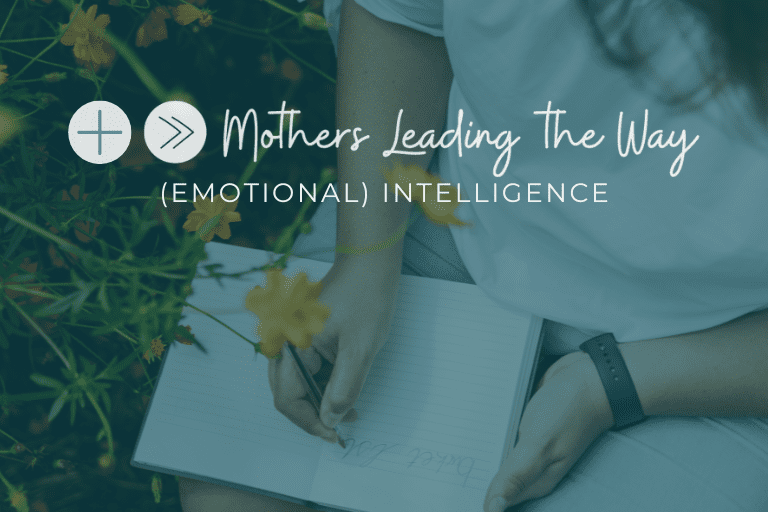Part 1: Understanding Emotional Intelligence
To excel as a parent, friend, employee, leader, and as a well-rounded individual, intelligence stands out as an indispensable skill. But intelligence is more than just our knowledge of facts and theories. In this four-part blog, we are going to explore different types of intelligence, specifically emotional and self-intelligence.
Today’s segment of our VALUES CAN INSPIRE positive psychology series explores emotional intelligence and how it can foster personal development and family growth.
What is emotional intelligence, and why does it matter?
Emotional intelligence (EI) refers to combining our thoughts, intuitions, feelings, and logic to problem-solve and make informed decisions. EI is the ability to understand and manage one’s own emotions and those of others (Goleman, 1995).
EI has been shown to boost success and satisfaction in all areas of life. In the workplace, utilizing EI leads to better communication with coworkers, increased productivity, and more confidence in one’s performance. For mental health and overall well-being, the aspect of EI that encourages the acknowledgment and constructive management of one’s emotions, rather than dismissal, is highly correlated with greater emotional resilience, enhanced social relationships, and improved mental health. When we maximize our emotional intelligence, we are able to better connect with our children, show empathy to others, navigate conflicts, and maintain positive emotional control.
The Components of Emotional Intelligence
EI includes four components: self-awareness, self-management, social awareness, energizers, and relationship management. Within each of these pillars of EI is a diverse set of skills that an individual can learn and practice to improve their work and leadership performance.
The four key components of EI:
- Self-awareness: Recognizing your emotions and their impact.
- Self-regulation: Managing or redirecting disruptive emotions and impulses.
- Relationship management: Understanding the emotional makeup of others. Includes the ability to influence, coach, and mentor others and manage conflict.
- Social Awareness: Handling relationships judiciously and empathetically. Showing empathy and being aware of the context of the relationship.
EI in the Workplace
For working mothers, EI in the workplace means navigating office politics, leading teams with empathy, and effectively managing stress. It involves understanding your emotional triggers and reacting to workplace challenges in a composed manner. High EI can lead to better job performance and career advancement (Goleman, 1998).
EI at Home
At home, EI is equally important. It’s about being present and empathetic with your family, understanding your children’s and partner’s emotional needs, and responding to them effectively. This skill is key in nurturing a supportive and loving family environment. A parent must hold the ability to identify their child’s needs, and address their emotions comprehensively and compassionately. This provides the child with reassurance and security. Studies have revealed that children with mothers possessing higher levels of emotional intelligence tend to exhibit reduced fear and stress during dental visits. Children may not always decipher their emotions and feelings accurately, and having a caring adult who can interpret their emotional cues provides stability and serenity. Importantly, emotional intelligence isn’t exclusive to adults, as research shows that children with well-developed EI forge stronger friendships early in life, display heightened creativity, and even achieve superior academic performance. Therefore, cultivating emotional intelligence isn’t just a valuable asset for adults but a skill well worth exemplifying for your children.
So, how do we cultivate emotional intelligence in order to reap these benefits?
To build emotional intelligence, you should first start by reconnecting with your own core emotions. Sometimes, as a parent, friend, or employee, we let our emotions get pushed aside to attend to the needs of others. However, an integral aspect of cultivating emotional intelligence requires that you develop an awareness of your own emotions and emotional needs. To do this, you might try journaling, practicing mindfulness, or just listening to your body cues.
Once you allow yourself to recognize your emotions, you should move to a place of accepting and honoring them. Our emotions may not align with those around us; however, skills we’ve learned throughout this series, such as self-compassion, mindfulness, and acceptance, will be important tools for you to turn to. Remember, our emotions don’t always have to make sense for us to honor and accept them.
Emotional Intelligence is not innate; it’s a skill that can be developed with practice and intention. As a working mom, enhancing your EI can lead to a more fulfilling career and a harmonious home life, creating a positive impact on both you and those around you.
References & Further Reading
Brackett, M. A., Rivers, S. E., & Salovey, P. (2011). Emotional intelligence: Implications for personal, social, academic, and workplace success. Social and Personality Psychology Compass, 5(1), 88-103. https://doi.org/10.1111/j.1751-9004.2010.00334.x
Elfenbein, H. A., & MacCann, C. (2017). A closer look at ability emotional intelligence (EI): What are its component parts, and how do they relate to each other? Social and Personality Psychology Compass, 11(7). https://doi.org/10.1111/spc3.12324
Gilar-Corbi, R., Pozo-Rico, T., Sánchez, B., & Castejón, J. L. (2019). Can emotional intelligence be improved? A randomized experimental study of a business-oriented EI training program for senior managers. Plos One, 14(10). https://doi.org/10.1371/journal.pone.0224254
Goleman, D. (1995). Emotional intelligence. Bantam.
Goleman, D. (1998). Working with emotional intelligence. Bantam.
Naser-Asl Aminabadi, N-A., Pourkazemi, M., Babapour, J., & Sina-Ghertasi Oskouei, S-G. The impact of maternal emotional intelligence and parenting style on child anxiety and behavior in the dental setting. Clinical and Experimental Dentistry, 17(6), 1089-1095. http://dx.doi.org/doi:10.4317/medoral.17839
Punia, S., & Sangwan, S. (2011). Emotional intelligence and social adaptation of school children. Journal of Psychology, 2(2), 83-87. https://doi.org/10.1080/09764224.2011.11885466

